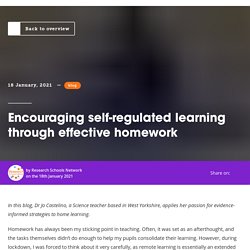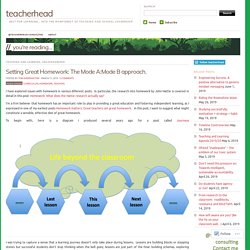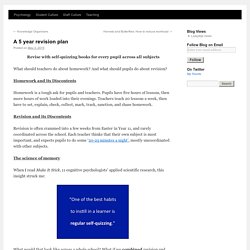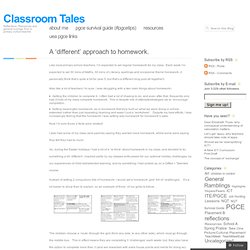Homework
> Domhdomh
Encouraging self-regulated learning…
In this blog, Dr Jo Castelino, a Science teacher based in West Yorkshire, applies her passion for evidence-informed strategies to home learning.

Homework has always been my sticking point in teaching. Often, it was set as an afterthought, and the tasks themselves didn’t do enough to help my pupils consolidate their learning. However, during lockdown, I was forced to think about it very carefully, as remote learning is essentially an extended period of homework. But unlike homework, we had no periods of face-to-face teaching in between tasks during lockdown. Several of my lower-attaining pupils struggled with the work during remote learning, and have returned to school feeling less confident. We know that secondary pupils can really benefit from good homework, and in our current climate of blended teaching, I think it will be particularly important to provide pupils with self-regulated learning strategies to work independently.
Setting Great Homework: The Mode A:Mode B approach.
I have explored issues with homework in various different posts.

In particular, the research into homework by John Hattie is covered in detail in this post: Homework: What does the Hattie research actually say? I’m a firm believer that homework has an important role to play in providing a great education and fostering independent learning, as I expressed in one of my earliest posts Homework matters: Great teachers set great homework. In this post, I want to suggest what might constitute a sensible, effective diet of great homework. To begin with, here is a diagram I produced several years ago for a post called Journeys I was trying to capture a sense that a learning journey doesn’t only take place during lessons.
However, we have to take account of the research evidence that suggests that homework is more effective for younger or less confident students when homework builds confidence and fluency.
The Truth About Homework. “Most homework teachers set is crap.”

Dylan Wiliam, ResearchEd 2014. The subject of homework inspires strong opinions. Teachers, parents and students themselves all have a view on the matter and those views are often diametrically opposed. Dylan Wiliam, back in 2014, shared a very strong opinion that didn’t exactly condemn the evidence and action related to homework to the dustbin, but he poked a gaping hole into our every assumption about homework and its impact. At Huntington School, we battled with the issues and surveyed the best available evidence, from the EEF Toolkit (Secondary and Primary – note the crucial differences here: homework is much more effective with older children), to specific recent studies on homework (this one via Dan Willingham). Homework (or home learning, or “extended learning” as we relabelled it at Huntington) is seemingly most effective when it involves practice or rehearsal of subject matter already taught.
We should pose ourselves some tricky questions:
A 5 year revision plan. Revise with self-quizzing books for every pupil across all subjects What should teachers do about homework?

And what should pupils do about revision? Homework and its Discontents Homework is a tough ask for pupils and teachers. Pupils have five hours of lessons, then more hours of work loaded into their evenings. Revision and its Discontents Revision is often crammed into a few weeks from Easter in Year 11, and rarely coordinated across the school. The science of memory When I read Make It Stick, 11 cognitive psychologists’ applied scientific research, this insight struck me: What would that look like across a whole school? A Long-Term Revision Strategy: Self-Quizzing At our school, from Year 7 onwards, homework is revision: self-quizzing for all pupils across all their subjects. Self-Quizzing Books Every pupil is given a self-quizzing book with every subject’s core knowledge. Practice Books Practice Book Checks We aim for 100% of pupils to complete their self-quizzing every evening. Like this:
A ‘different’ approach to homework.
Like most primary school teachers, I’m expected to set regular homework for my class.

Each week I’m expected to set 30 mins of Maths, 30 mins of Literacy, spellings and occasional theme homework. (I personally think that’s quite a bit for year 5, but that’s a different blog post all together!) Also like a lot of teachers I’m sure, I was struggling with a two main things about homework:- Getting the children to complete it- I often had a lot of chasing to do, and even after that, frequently only had 2/3rds of my class complete homework. This is despite lots of attempts/strategies etc to ‘encourage’ completion. Now I’m sure those 2 facts were related! I also had some of my class (and parents) saying they wanted more homework, whilst some were saying they felt they had to much.





